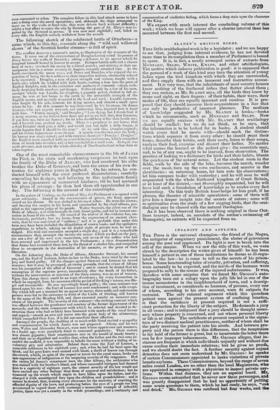SLANEY'S BRITISH BIRDS.
THIS little ornithological work is by a legislator; and we are happy to see that, judging from internal evidence, he has not devoted more time to its compilation than a member of Parliament is bound to spare. It is, in fact, a neatly arranged series of extracts from MONTAGU, SELBY, WHITE, KNAPP, and other ornithologists,.
The motive which induces publication is good: it is supposed that the perusal of a work of this kind may turn the attention of young ladies upon the bird kingdom with which they are surrounded, and thus supply them with an innocent and instructive amuse- ment. It is very true, that the inhabitants of most country houses know nothing of the feathered tribes that flutter about them ; they can reckon, as Mr. SLANEY says, all the birds they know by name and sight, on their fingers: of their habits, their ways, their modes of life, they are equally ignorant and careless. It is pro- posed that they should increase their acquaintance in a line that can only be productive of innocent pleasure. The medium of knowledge suggested by Mr. SLANEY is books,—books which he recommends, such as MONTAGU and SELBY. Now we are equally anxious with Mr. SLANEY that ornithology should be studied: but we do not think, as he says, that the information is to be looked for in books. A student should watch every bird he meets with—should mark the distinc- tions which separate it from every other: he should paint their forms, describe their habits, seek their nests, listen to their songs, analyze their food, examine and dissect their bodies. No matter what names the learned or the pedant give : the essentials may, and, to be of any use, ought to be learned, from observation. The practice of looking to a dictionary for birds and their habits, blunts the quickness of the natural sense. Let the student roam in the fields, walk by the side of the lake, traverse the marsh, wander over the moor, turn up the corn enclosures, and saunter in the shrubberies : on returning home, let him note his observations; let him compare to-day with yesterday; and he will soon be well acquainted with the whole feathered kingdom of Great Britain, or at least of the district,—not thoroughly acquainted, but he will have laid such a foundation of knowledge as to render every fact interesting. On this truly British knowledge let him graft, if he pleases, the theories of scientific speculators : some of them will give him a deeper insight into the secrets of nature; some will so spiritualize even the study of a few singing-birds, that the orni- thologist may be classed with the natural theologian.
As it has been observed there is nothing original in these Out- lines (except, indeed, an anecdote of the author's swimming off Ramsgate), no extracts will be expected from us.


























 Previous page
Previous page